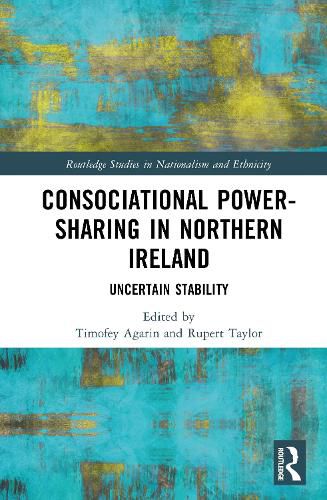Readings Newsletter
Become a Readings Member to make your shopping experience even easier.
Sign in or sign up for free!
You’re not far away from qualifying for FREE standard shipping within Australia
You’ve qualified for FREE standard shipping within Australia
The cart is loading…






Consociational Power-Sharing in Northern Ireland, from leading scholars in the field, explores the evolution and challenges of consociational power-sharing in Northern Ireland for politics and societal relations.
Contributors to the book highlight that scholarship on consociational democracy anticipates political stability and continuous integration in post-conflict societies. However, over twenty-five years on from the Good Friday Agreement concerns remain about the adequacy of consociational power-sharing to ensure a fully functional form of government capable of providing stability and of addressing deeper political and social issues: While violence is absent, ethno-national identities remain in a state of a fragile equilibrium, and aspirations for significant progress on key issues like truth, justice, mutual respect, and socio-political inclusion have not been met. The reasons as to why this is so, and what can be done to rectify it, are central to the arguments that animate this timely book.
Consociational Power-Sharing in Northern Ireland will be of great interest to students and scholars in political science, law and constitutionalism, nationalism and ethnicity, and those interested in related topics in sociology and criminology. It will also appeal to practitioner communities related to powersharing, political representation and constitutional politics.
$9.00 standard shipping within Australia
FREE standard shipping within Australia for orders over $100.00
Express & International shipping calculated at checkout
Consociational Power-Sharing in Northern Ireland, from leading scholars in the field, explores the evolution and challenges of consociational power-sharing in Northern Ireland for politics and societal relations.
Contributors to the book highlight that scholarship on consociational democracy anticipates political stability and continuous integration in post-conflict societies. However, over twenty-five years on from the Good Friday Agreement concerns remain about the adequacy of consociational power-sharing to ensure a fully functional form of government capable of providing stability and of addressing deeper political and social issues: While violence is absent, ethno-national identities remain in a state of a fragile equilibrium, and aspirations for significant progress on key issues like truth, justice, mutual respect, and socio-political inclusion have not been met. The reasons as to why this is so, and what can be done to rectify it, are central to the arguments that animate this timely book.
Consociational Power-Sharing in Northern Ireland will be of great interest to students and scholars in political science, law and constitutionalism, nationalism and ethnicity, and those interested in related topics in sociology and criminology. It will also appeal to practitioner communities related to powersharing, political representation and constitutional politics.